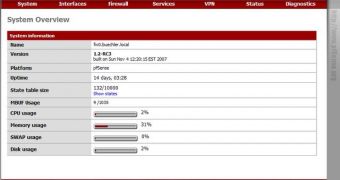The pfSense development team announced the availability of pfSense 1.2, a m0n0wall-derived operating system. After more than 16 months of work, since the 1.0 release, this version brings you many new features and bugfixes.
Here are the highlights of pfSense 1.2:
- Improve CARP input validation - GUI previously allowed incorrect configurations that caused panics. Fixed to not allow entry of such configurations, so typos and configuration errors cannot crash system. - Clarify text and fix typos on several screens. - Revert DHCP client to default timeout of 60 seconds. - Reload static routes when an interface IP address is changed by an administrator. - Fix a few areas allowing potential cross site scripting. - Fix a couple issues with package uninstalls. - Shorten firewall rule, NAT and traffic shaper description fields to prevent users from entering description names too long for the pf ruleset. - Fix traffic shaper queue name generation to prevent creating invalid ruleset for interface names longer than 15 characters. - Improve efficiency of RRD graph creation by removing duplicate commands. Graph updates now use less CPU time.
pfSense uses Packet Filter, Free BSD 6.x, ALTQ for packet queuing and an integrated package management system. pfSense includes almost all the features included in commercial firewalls, and adds its own to make a complete security solution. The firewall can filter by source and destination IP/port for TCP and UDP traffic, IP protocol, is able to limit simultaneous connections on a per-rule basis and much more.
The state table of the firewall maintains information on your open network connections, and pfSense is a stateful firewall, meaning that all rules are stateful by default. The size of the state table can be adjusted by increasing it on the fly. Each state takes almost 1KB of RAM, and the developers advise you to be careful when you adjust the size of the state table.
Download pfSense 1.2 right now from Softpedia!

 14 DAY TRIAL //
14 DAY TRIAL //